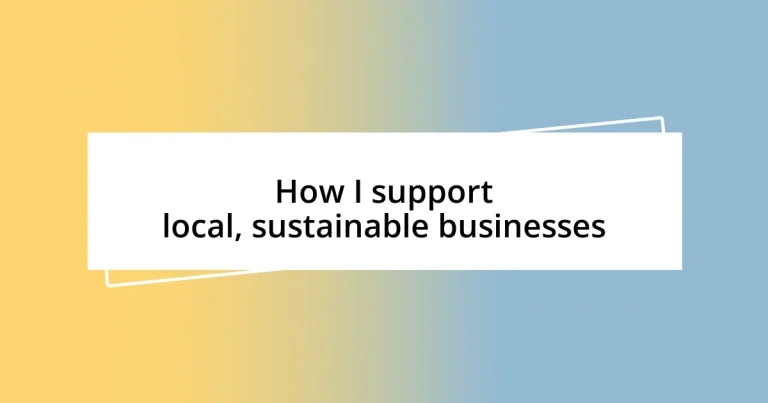Key takeaways:
- Supporting local businesses fosters community connections, provides unique products, and helps sustain local economies.
- Engagement in community events and personal relationships with vendors enhances appreciation for local artisans and their stories.
- Advocating for sustainable policies promotes environmental responsibility and encourages collaboration among community members for positive change.
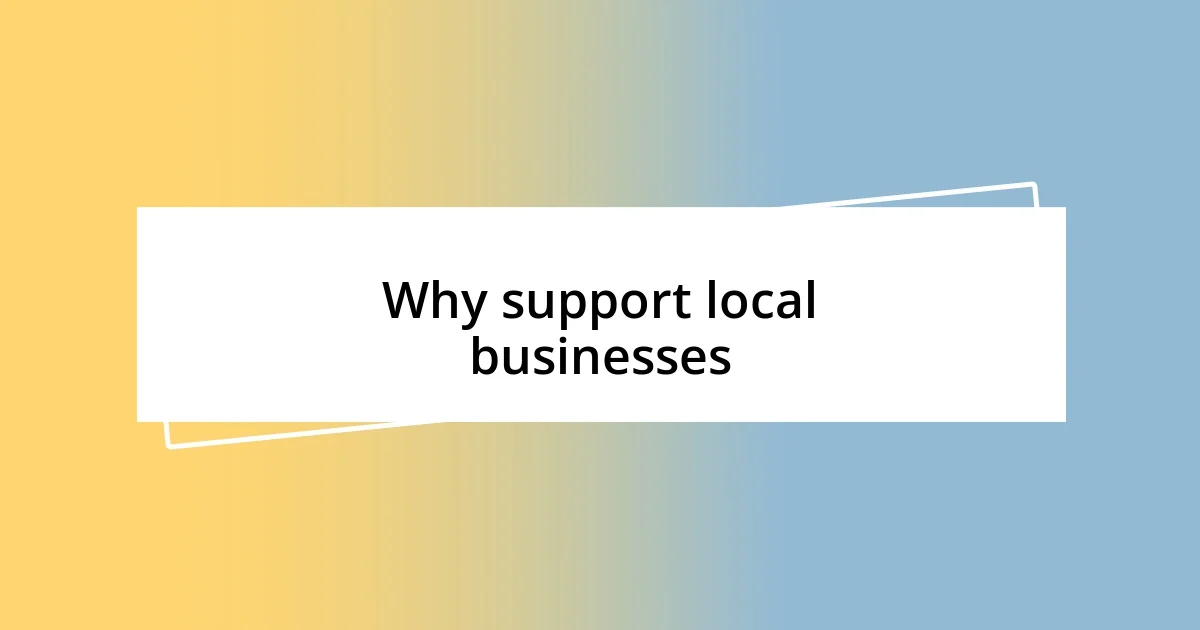
Why support local businesses
Supporting local businesses is crucial because it directly impacts the community. When I stroll through my neighborhood and stop by the artisan bakery down the street, I can feel the warmth and passion that goes into every loaf. Isn’t it rewarding to know that my purchase helps a neighbor pay their bills and keep their dream alive?
Local businesses often provide unique products that you simply can’t find in larger retail chains. I still remember discovering a charming boutique that sold handcrafted jewelry made by a local artist. Each piece had a story, and wearing it felt like having a little piece of the community with me. Don’t you find it exciting to wear something special, knowing it supports someone’s craft and creativity?
Furthermore, when we choose to support local businesses, we foster community connection. I’ve met some amazing people at the farmer’s market, each with a story to tell and a passion for their product. It’s a beautiful reminder that our choices can help cultivate a sense of belonging. How often do we think about the connections we can create just by shopping locally?

Benefits of sustainable practices
Sustainable practices bring numerous benefits, particularly in terms of environmental impact. I’ve watched my local businesses embrace eco-friendly methods, from sourcing organic ingredients to reducing waste. It’s heartening to see how these practices can help preserve our planet for future generations.
Moreover, there’s a tangible sense of community pride tied to supporting sustainable enterprises. When I visit a local shop that practices sustainability, I can feel the collective effort behind it. For instance, the café around the corner not only serves delicious coffee but also employs a recycling program for its cups. Knowing that my choices help maintain these initiatives fills me with satisfaction.
Financially, sustainable businesses can see significant savings over time. Implementing green practices often means lower energy costs. I recall speaking with a local farmer who switched to solar energy; she couldn’t stop smiling when she explained how her utility bills decreased. It reminded me that sustainability isn’t just about doing good—it’s also about thriving economically.
| Benefits | Description |
|---|---|
| Environmental Impact | Reduces carbon footprint and conserves resources |
| Community Pride | Fosters connection and supports local initiatives |
| Financial Savings | Lower operational costs and improved efficiency |
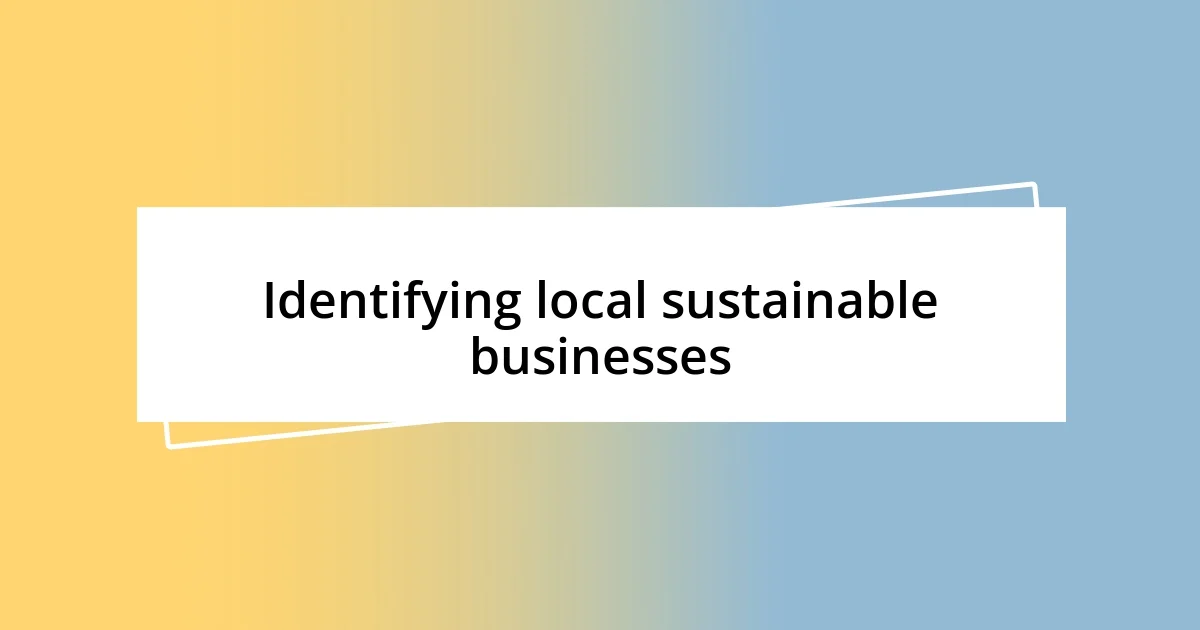
Identifying local sustainable businesses
Identifying local sustainable businesses can sometimes feel daunting, but there are key indicators that stand out. Personally, I rely on a mix of research and my own explorations. For me, a strong sign is when a business actively engages in environmentally friendly practices, such as offering organic products or utilizing sustainable packaging. I can remember my first visit to a local co-op; the moment I walked in, the emphasis on eco-conscious living was palpable, and it instantly drew me in.
To help you spot these gems, consider the following aspects:
- Locally Sourced Ingredients: Check if they support local farmers or artisans when sourcing their products.
- Transparency: Look for businesses that openly discuss their sourcing and production processes, showing their commitment to sustainability.
- Community Engagement: Pay attention to how they engage with the local community, whether through events or partnerships with local organizations.
- Certifications: Seek out businesses with sustainability certifications, like Fair Trade or organic labels.
- Recycling and Waste Reduction: Notice if they have programs in place for recycling or minimizing waste.
Exploring these elements has not only deepened my appreciation for local businesses but has also provided a sense of connection to the heart of my community. It feels rewarding to know I’m consciously supporting those who share my values.
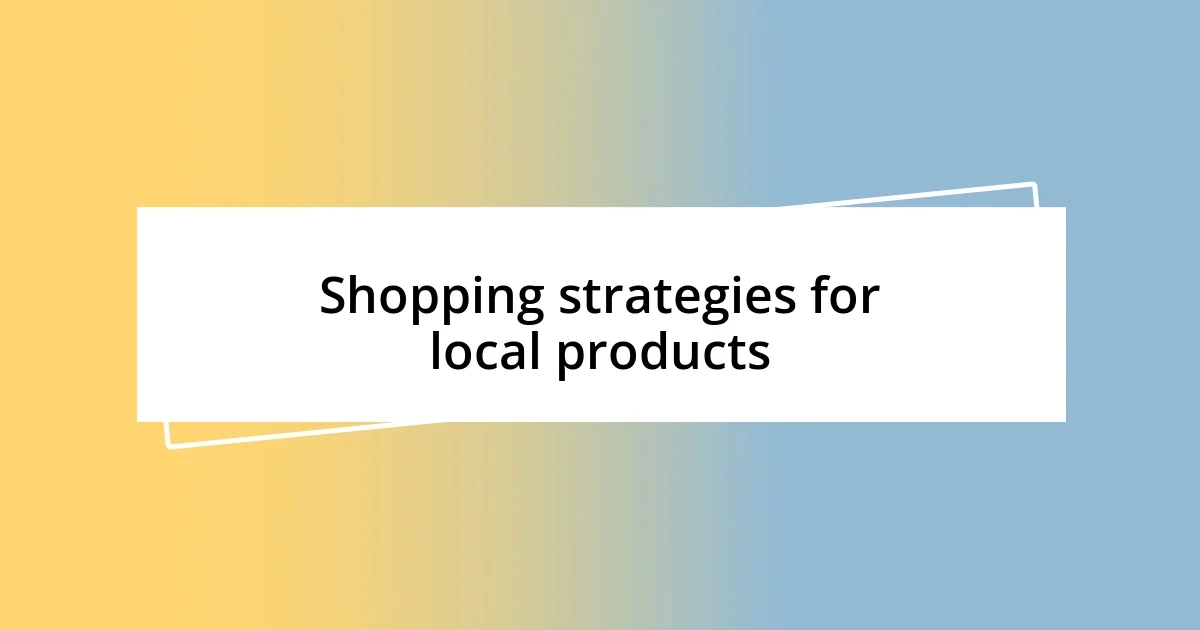
Shopping strategies for local products
Shopping local doesn’t just benefit the environment; it also allows me to support my community on a more personal level. I often stroll through farmer’s markets and feel the energy of local vendors eager to share their stories. There’s something special about listening to a farmer explain the journey of their produce from seed to table—it even makes the fruits and vegetables taste better!
A practical approach I use is making a list of local businesses I want to support and then planning my errands around them. For instance, I once set aside a Saturday to visit a few artisanal bread shops in my area. I was pleasantly surprised to discover how many unique flavors and techniques each shop had to offer—like that quirky place that infuses herbs directly into their dough. This wasn’t just a shopping trip; it turned into a delightful event that expanded my palate and helped me connect with my community.
When considering my purchases, I always ask myself if the product aligns with my values. If I’m debating between a national brand and a local artisan, I reflect on the impact of my choice. Recently, while shopping for home goods, I found myself torn between a big-box store and a local craftsman. Remembering how much I valued supporting my community, I chose the latter and ended up with a beautifully handcrafted table that tells a story. What could be more rewarding than that?

Supporting community events and initiatives
Engaging with community events is one of my favorite ways to support local businesses. Just last month, I attended a local arts festival where vendors displayed their handmade crafts and organic foods. It was thrilling to see how many community members turned out, all eager to support our local artisans. Isn’t it amazing how these events can transform a simple day into a vibrant celebration of creativity and sustainability?
I’ve also found that volunteering at these events opens even more doors for connection. For example, I helped organize a small clean-up during a local music festival. Not only did it bring awareness to environmental issues, but the sense of camaraderie among participants was electric. I remember chatting with a local baker who was donating treats for the musicians while we shared ideas on how to make our events even greener. Sharing these experiences helps me feel more invested in both the community and the businesses that thrive here.
Moreover, community initiatives often showcase the passion of local entrepreneurs. I was so taken by a pop-up event focused on sustainable fashion last summer that I ended up striking up a conversation with a designer who repurposes thrifted materials. Listening to her journey of transforming discarded fabrics into beautiful clothing left me inspired. It made me realize that by attending these events, we’re not just buying products; we are uplifting stories that deserve to be shared. How often do our purchases reflect our commitment to supporting unique narratives and foster connections that enrich our lives?
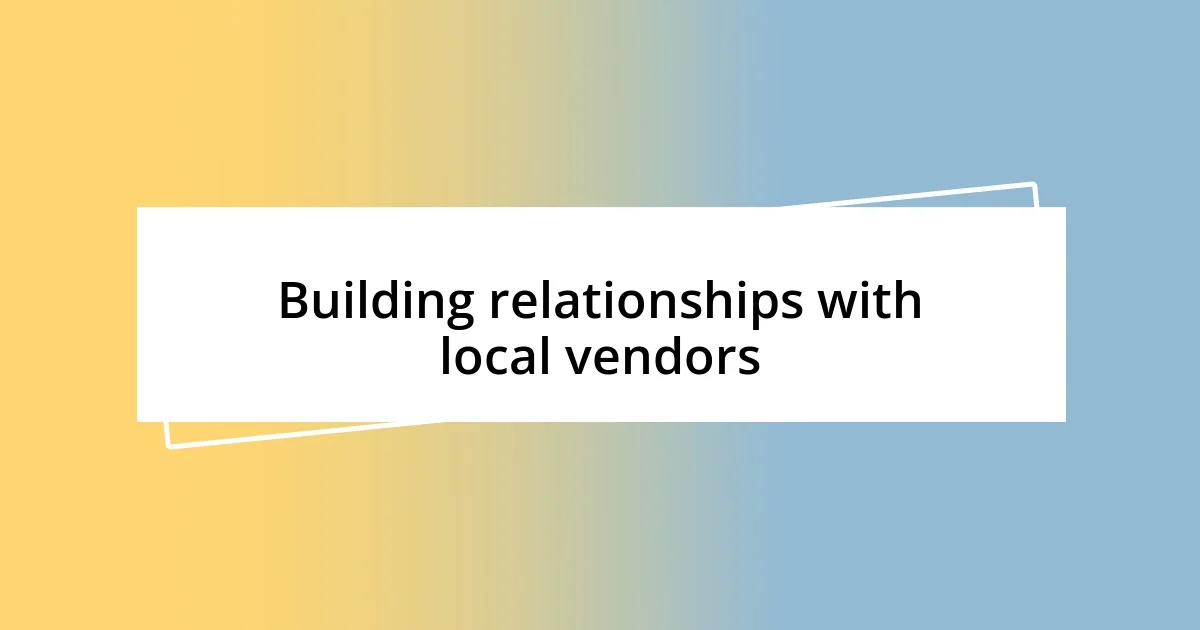
Building relationships with local vendors
Establishing connections with local vendors is both rewarding and enriching. I remember the first time I visited a small, family-run bakery in my neighborhood. The owner, Marissa, welcomed me with a warm smile and a slice of her famous chocolate croissant. Our conversation flowed effortlessly, and I learned about her passion for baking and the secret family recipe that had been passed down for generations. It’s moments like these that remind me that every purchase is an opportunity to support someone’s dream.
Building these relationships goes beyond mere transactions; it involves fostering a genuine sense of community. I often find myself popping into the downtown market not just to grab fresh produce but to catch up with my favorite vendors. One afternoon, as I chatted with a local cheese maker, he shared his journey from corporate life to artisanal cheese crafting. It made me reflect on my own aspirations and how much we can learn from each other’s paths. Isn’t it remarkable how these conversations can spark inspiration not just for business, but for our personal lives?
When I think about the vendors I’ve built relationships with, I realize how much they’ve impacted my shopping habits. Their stories and dedication have influenced my choices significantly. The other day, I needed a gift and instinctively turned to a local potter whose work I admire. As I selected a hand-thrown mug, I remembered her journey of turning a passion for clay into a thriving business. Choosing to support her felt right, and it deepened my understanding of the intricate bond between consumers and local artisans. Don’t you find that relationship to be incredibly fulfilling?

Advocating for sustainable policies
Advocating for sustainable policies often feels like a crucial step toward fostering a healthier community. I recall attending a town hall meeting where local business owners shared their thoughts on implementing eco-friendly regulations. It was fascinating to hear their perspectives on how policies could not only protect the environment but also enhance their bottom line. Have you noticed how collective voices can lead to meaningful change?
One of the most impactful moments I experienced was when I joined a local advocacy group focused on sustainable agriculture. The excitement in the room was palpable as we discussed initiatives encouraging farmers to adopt organic practices. Collaborating with passionate individuals ignited a sense of purpose in me. It made me realize that my small contributions could help nurture a culture prioritizing sustainability over convenience.
Another rewarding experience came when I participated in a campaign promoting the use of reusable bags in our community. Connecting with others who shared my mission was inspiring; it truly felt like we were on the brink of shifting mindsets. Sharing success stories about reduced plastic waste motivated me to engage my friends and family in the conversation. Isn’t it fascinating to think about the ripple effect we can create by advocating for sustainable choices and policies?












